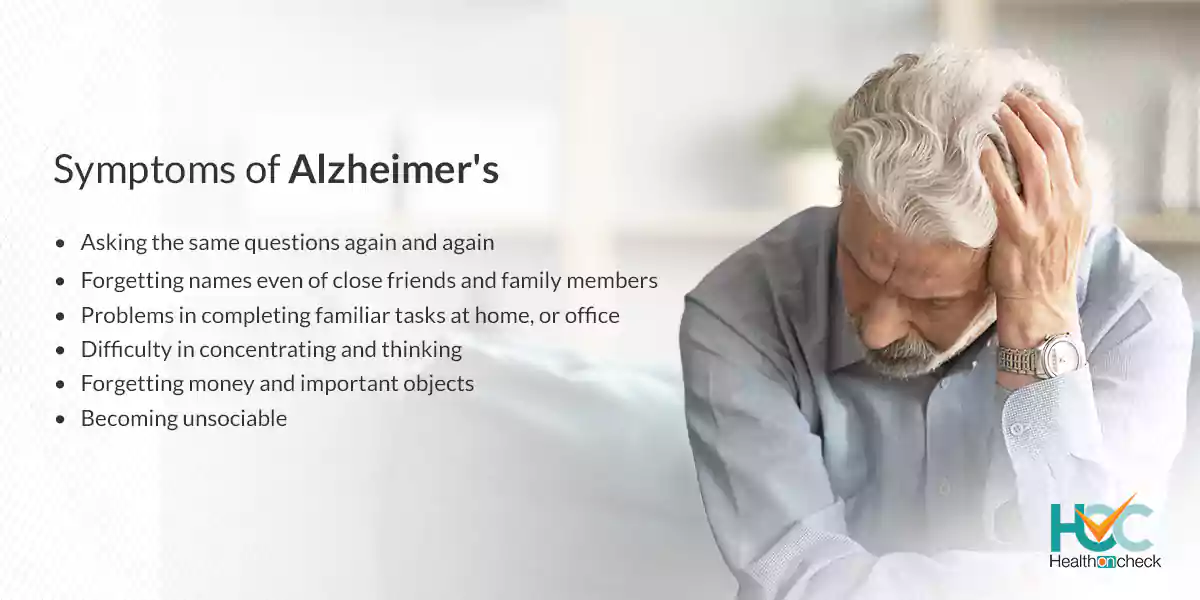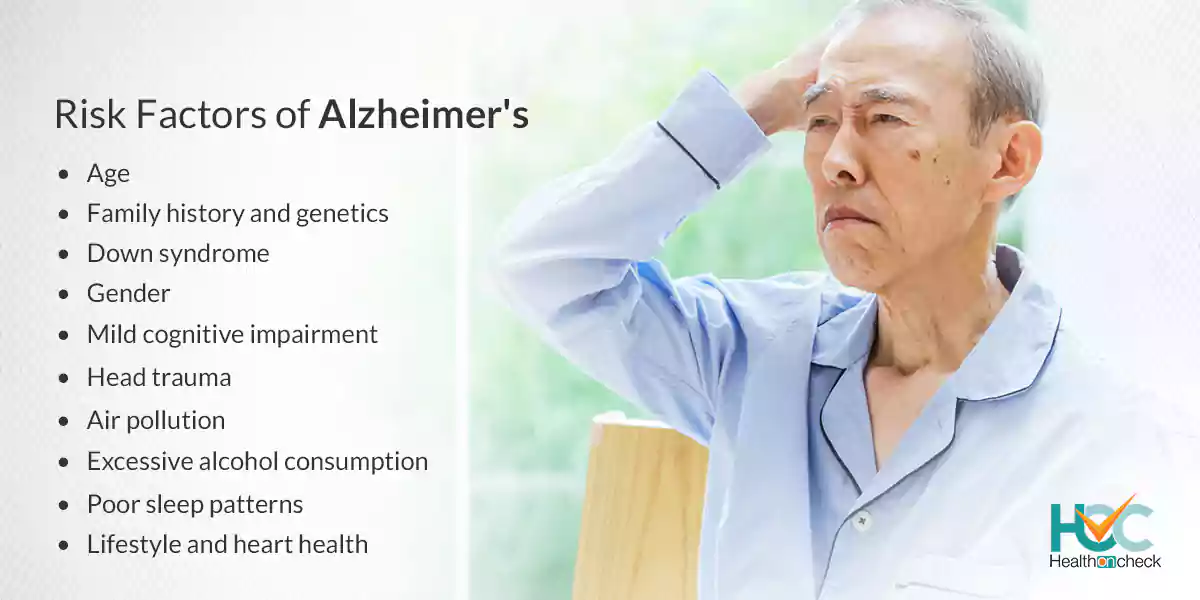All about Alzheimer’s

What is Alzheimer’s Disease?
Alzheimer’s disease is a progressive neurologic disorder and is one of the most common types of dementia where memory problems that advance with time. It happens when the brain starts to shrink (atrophy) and brain cells dies because of neurologic disorder. Age is one of the main factors of Alzheimer’s disease but everyone doesn’t need to get it after passing a certain age.
This disease affects the parts of the brain that control thought, memory, and language. It can seriously affect a person’s ability to carry out daily activities because of memory-related issues.
What are the Types of Alzheimer’s Disease?
- Early-onset Alzheimer’s: This type occurs among people whose ages are less than 65, mostly in their 40s or 50s and it’s rare as only 5% of people with Alzheimer’s Disease have it mostly those who already have Down syndrome have a higher risk for it. The early-onset type is linked with a defect in a precise part of a person’s DNA known as chromosome 14.
- Late-onset Alzheimer’s: Late-onset Alzheimer’s is the most prevailing form of this condition and it occurs in people who are more than the ages 65 and above. Till now researchers haven’t found the exact gene that causes it.
- Familial Alzheimer’s disease (FAD): According to doctors and researchers, it is the type of Alzheimer’s disease that is connected to genes. It is hereditary and there is a high risk of getting affected by it members of at least two generations have already suffered from Alzheimer’s. It is the rarest s only 1% of all cases of Alzheimer’s get affected by this type.
What are the Symptoms of Alzheimer’s Disease?
Though Alzheimer’s disease is not a regular part of ageing but senior citizens have more chances of getting affected by this ailment as compared to young people. The first few signs of this condition include forgetting recent events or conversations. As the disease grows, problems like severe memory impairment and loss of the ability to carry out everyday tasks start. Along with memory problems, a few more symptoms of Alzheimer’s disease are:

- Memory loss that disturbs daily life, like forgetting even the familiar places
- Asking the same questions again and again
- Forgetting names even of close friends and family members
- Problems in completing familiar tasks at home, or office
- Misplacing things and being unable to retrace steps to find them.
- Fluctuations in mood, personality, or behavior.
- Difficulty in concentrating and thinking,
- Depression
- Becoming unsociable
- Forgetting money and important objects
How is Alzheimer’s Disease Diagnosed?
To diagnose Alzheimer’s disease doctors do various examinations and tests to measure your mental skills, and diagnose dementia, and other ailments. The most common questions the doctors ask are:
- If you have at least two symptoms of Alzheimer’s
- Checks your family medical history
- Other health problems
- Medical history
- Medications
- Fooding and other lifestyle habits
- Alcohol or drug abuse
From there, your doctor will likely request several tests to help determine if you have Alzheimer’s disease such as:
- Alzheimer’s tests: There’s no decisive test for Alzheimer’s disease. Though, mental, physical, neurological, and imaging tests can aid to diagnose it. At first, the doctor will take a mental status test. This is to access your short and long-term memory issues, orientation to place and time, asking questions like what date it is, some common general knowledge questions, names of your family members, etc. Next, they’ll likely conduct a physical exam such as checking your blood pressure, heart rate, body temperature and in some cases may ask for urine or blood along with a neurological exam.
- Magnetic resonance imaging (MRI) scan: MRIs can aid to find key elements, like inflammation, bleeding, and structural issues.
- Computed tomography (CT) scan: CT scans involve taking X-ray images, which can aid your doctor find out abnormal characteristics in your brain if any.
What Are The Treatment Options For Alzheimer’s Disease?
Till now no cure for Alzheimer’s disease has been found but some medications for the time being slow the deteriorating of dementia symptoms and aid with behavioral problems that may occur during the illness.
There are two types of medicines are currently available used to ease down the symptoms:
- Cholinesterase inhibitors: These medicines boost the levels of cell-to-cell communication by conserving a chemical messenger that is worn out in the brain by Alzheimer’s disease. These are generally the first medicines tried, and most people have meek improvements Cholinesterase inhibitors can also advance neuropsychiatric symptoms, like agitation or depression. Usually prescribed cholinesterase inhibitors are donepezil (Aricept), rivastigmine (Exelon), and galantamine (Razadyne ER). But these medicines may have some side effects like diarrhea, nausea, loss of appetite, and insomnia. People with some heart disorders may face severe side effects like cardiac arrhythmia.
- Memantine (Namenda):This medicine works in the brain cell communication network and slackens the development of symptoms with modest to severe Alzheimer’s disease. It’s from time to time used in amalgamation with a cholinesterase inhibitor. Comparatively rare side effects may occur such as dizziness and confusion. Apart from medications, an Alzheimer’s disease patient needs proper care and environment to feel normal and lead a decent life. Make them feel normal and always keep important things like wallets, keys, mobile phones, etc. in the same place to keep them safe and not lose them. Keep the patient some device like a smart watch or mobile phone with trackers to find them in case they get lost. Even if they don’t remember you, make sure that they feel a familiar environment at home.
What are the Complications of Alzheimer’s Disease?
Alzheimer’s can obscure treatment for other health disorders because of memory and language loss, impaired judgment, and other mental changes. Alzheimer’s disease patients may not be able to communicate clearly what they are experiencing, explain symptoms of other health issues, follow the prescribed treatment methods or clarify the side effects of medications.
As Alzheimer’s disease grows to its final stages, brain changes start to affect physical tasks, like swallowing, balancing body movements, and bowel and bladder control. These issues can upsurge susceptibility to further health problems like:
- Slugging food or liquid into the lungs
- Serious illnesses like flu, pneumonia, and other infections
- Falling and getting fractures
- Bedsores
- Undernourishment or dehydration
- Constipation or diarrhea
- Dental disorders
What are the risk factors of Alzheimer’s disease?

- Age: Though young people also suffer from Alzheimer’s disease but people above the age of 65 have more risk of getting Alzheimer’s disease.
- Family history and genetics: If anyone in your family or earlier generation had Alzheimer’s disease, the risk of getting this disease increases
- Down syndrome: People who have Down syndrome have a higher risk of developing Alzheimer’s disease. Symptoms of Alzheimer’s start to appear 10 to 20 years earlier in people with Down syndrome than in others
- Gender: Though both genders can get this disease but there are more women with the disease because they normally live longer than men.
- Mild cognitive impairment: People who have MCI have a substantial risk of getting dementia and have more prone to dementia because of Alzheimer’s disease.
- Head trauma: People with severe head trauma have a greater risk of Alzheimer’s disease. Numerous studies found that people above the age of 50 or older who had some kind of brain injury increase the risk of dementia and Alzheimer’s disease
- Air pollution: Air pollution exposure particularly from traffic exhaust and burning wood is associated with greater dementia risk.
- Excessive alcohol consumption: Drinking alcohol regularly in large amounts may cause brain changes. Numerous large studies found that alcohol relate disorders were connected to an increased risk of dementia, particularly early-onset dementia.
- Poor sleep pattern: Poor sleep patterns, like difficulty in falling asleep or insomnia, are related to an increased risk of Alzheimer’s disease.
- Lifestyle and heart health: Bad lifestyles such as lack of physical activity or exercise, obesity, alcohol, and drug abuse, and smoking may result in Alzheimer’s disease. Also, people with High blood pressure and cholesterol are more prone to this ailment.
What are the Causes of Alzheimer’s Disease?
The precise causes of Alzheimer’s disease are not clear yet but scientists, researchers, and doctors are trying to find out the causes of Alzheimer’s disease and it’s believed that the role of two proteins causes this disease which are:
- Beta-amyloid is a portion of a bigger protein. When these fragments gather they can have a harmful effect on neurons and interrupt cell-to-cell communication. These clusters may create higher deposits called amyloid plaques, which also comprise other cellular debris.
- Tau proteins play a part in a neuron’s internal support and transport system to carry nutrients and other essential materials. In Alzheimer’s disease, tau proteins change shape and organize themselves into structures called neurofibrillary tangles. The tangles disrupt the transport system and are toxic to cells.
Living with Alzheimer’s Disease
On average, a person with Alzheimer’s has a life expectancy of four to eight years after diagnosis but can live up to 20 years, based on many factors. Living with Alzheimer’s or dementia can be devastating at times, which can affect your health and ability to carry out even normal tasks. A caring family is needed to take care of the patient. You should have a proper diet so that your health will be in good condition. It’s usual to feel an array of emotions after getting diagnosed with Alzheimer’s or another dementia. Accepting your emotions will benefit you move forward and learn ways to live a positive and gratifying life
Whom to Consult?
Getting checked by your doctor preferably a psychiatrist to check if the symptoms you are facing are related to Alzheimer’s disease or some other ailments like a vitamin deficiency or a side effect of medication. Early and correct diagnosis also offers chances for you and your family to ponder financial planning; advances advance directives, join in clinical trials and foresee care requirements.




